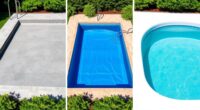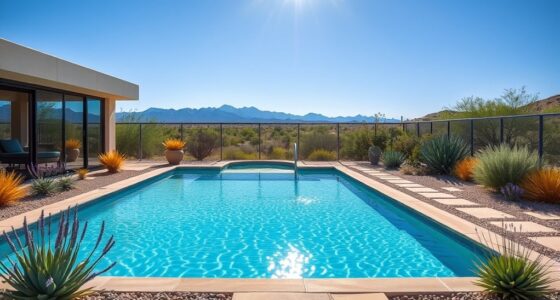The rise of natural swimming pools reflects a shift toward eco-friendly, chemical-free water spaces that benefit your health and the environment. Instead of using harmful chemicals, these pools rely on biological filters, aquatic plants, and sustainable design principles to stay clean. They support local wildlife and reduce energy consumption. As more people embrace these sustainable options, you’ll discover innovative design ideas and eco-conscious technologies that make natural pools an attractive, long-lasting choice for enjoying water naturally.
Key Takeaways
- Increasing environmental awareness drives the popularity of chemical-free, eco-friendly natural pools.
- Innovations in biological filtration and sustainable materials enhance natural pool design.
- Cost-effective and energy-efficient features make natural pools more accessible to homeowners.
- Regulatory support and eco-conscious trends promote the adoption of sustainable water features.
- Natural pools offer biodiversity benefits and integrate seamlessly into natural landscapes.
The Environmental and Health Benefits of Natural Pools
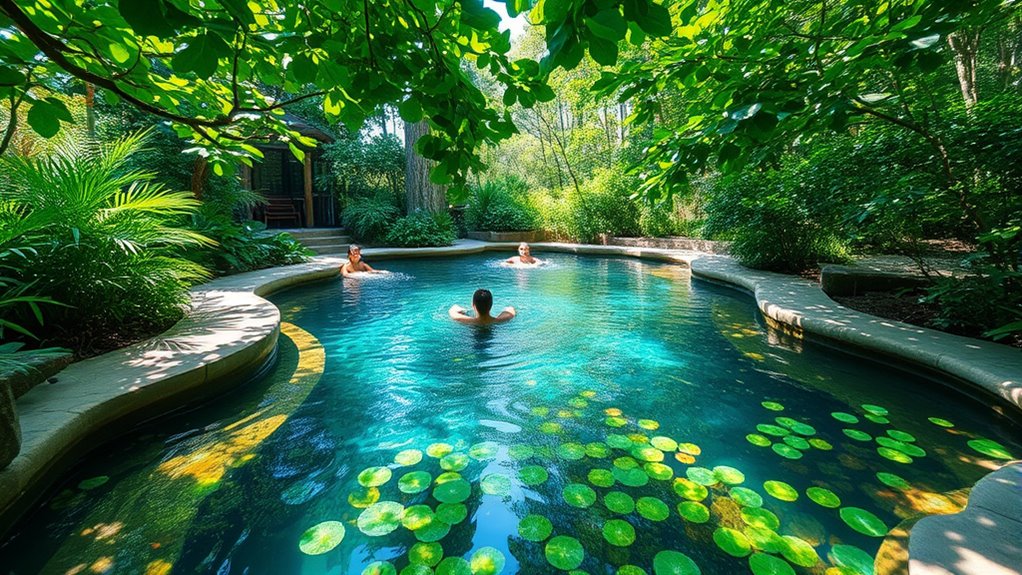
Natural pools offer significant environmental and health advantages over traditional chlorinated pools. You won’t need harmful chemicals like chlorine or bromine, which can irritate your skin, eyes, and respiratory system. Instead, natural pools use biological filters and aquatic plants to keep the water clean, reducing chemical runoff that pollutes nearby ecosystems. This eco-friendly approach minimizes energy consumption because there’s no need for complex filtration or chemical treatments. As a result, you enjoy safer, healthier water that’s free from irritants and toxins. Additionally, natural pools promote biological filtration, creating a balanced ecosystem that supports local wildlife and promoting biodiversity. This integrated ecological system creates a sustainable, health-conscious alternative that benefits both your well-being and the environment, while also encouraging sustainable water management practices that conserve resources. Incorporating natural filtration methods can further enhance water clarity and quality, making your pool a true reflection of eco-conscious design.
Design and Construction of Eco-Friendly Swimming Spaces
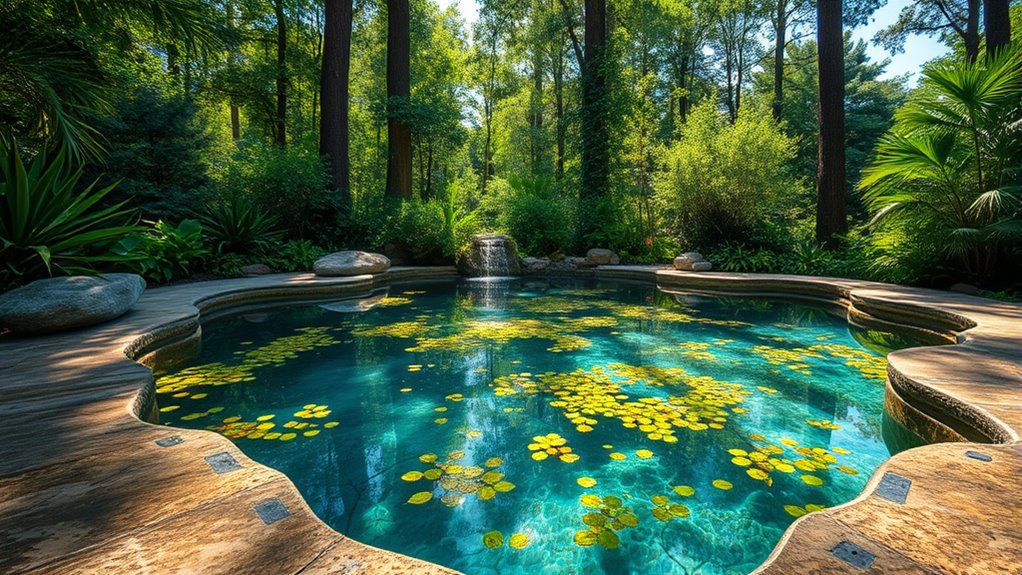
Designing and constructing eco-friendly swimming spaces requires careful planning to balance aesthetics, functionality, and sustainability. You’ll start by choosing natural materials like stone, gravel, and biodegradable liners that blend seamlessly with the environment. Focus on integrating biological filtration systems, such as植生 zones, which naturally purify water without chemicals. Proper sizing and placement of plants are vital to ensure effective water cleaning and minimal maintenance. You’ll also need to design for good water circulation, avoiding stagnant areas. When building, prioritize energy-efficient pumps and solar-powered systems to reduce your carbon footprint. Keep in mind local regulations and environmental impact during planning. With thoughtful design and sustainable construction techniques, you create a beautiful, functional, and eco-friendly swimming space that harmonizes with nature.
Comparing Traditional and Natural Pool Technologies
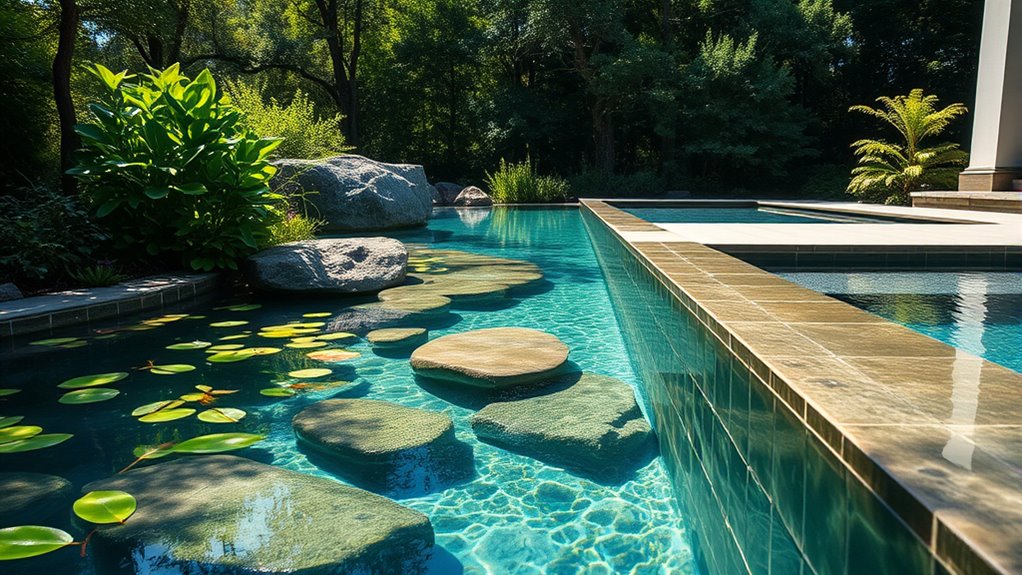
While traditional pool technologies rely heavily on chemical treatments and mechanical filtration, natural pools employ biological processes to maintain clean water. They use plants, beneficial bacteria, and natural filtration systems instead of chlorine and chemicals. This approach creates a more eco-friendly environment and reduces chemical exposure. Natural pools typically have a built-in regeneration zone, which continuously filters water naturally. In contrast, traditional pools require regular chemical balancing and mechanical maintenance. Here are key differences:
- Traditional pools depend on chlorine and chemicals for disinfection.
- Natural pools use biological filters and plant life.
- Chemical treatments can cause skin and eye irritation.
- Natural pools promote biodiversity and a more natural aesthetic.
- Maintenance varies: chemicals need regular testing, while natural pools focus on balancing ecosystems.
A key aspect of natural pools is their reliance on natural materials, which enhance their sustainability and ecological harmony, and their integration into the surrounding environment encourages biodiversity.
Maintenance and Longevity of Natural Swimming Environments

Maintaining a natural swimming environment requires regular attention to keep the ecosystem balanced and water clear. You’ll need to monitor water chemistry, ensuring pH levels stay stable and nutrients don’t build up. Regularly remove debris and check the biological filters to prevent clogging. Plants in the regeneration zone play a crucial role in filtering water, so trimming and healthy growth are essential. Incorporating eco-friendly practices into your routine can further enhance the ecological balance of your natural pool. Additionally, understanding the water cycle within your ecosystem can help optimize filtration and nutrient use. Ensuring proper soil health supports the growth of beneficial plants and microorganisms that contribute to water quality. Proper maintenance supports sustainable forestry principles by ensuring the health of the plants and organisms involved. Regularly inspecting the system and using appropriate cleaning methods can prevent the buildup of unwanted substances. With proper care, your natural pool can last for decades, as the ecosystem self-regulates when maintained correctly. Investing time in routine inspections and minor adjustments ensures longevity and minimizes costly repairs or replacements. Ultimately, a well-maintained natural swimming environment provides a sustainable, beautiful space to enjoy for years to come.
The Future Outlook for Sustainable Recreational Water Features
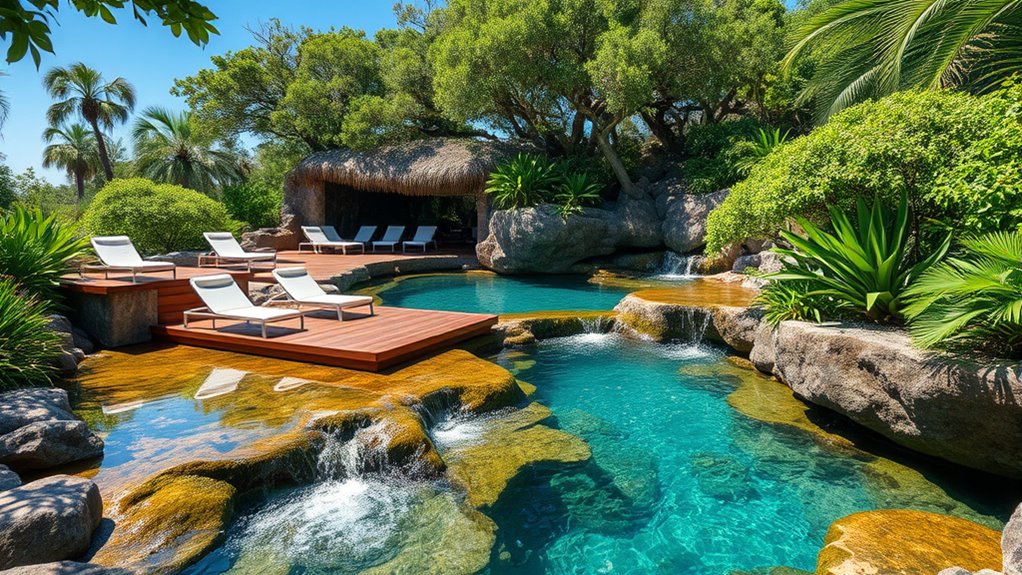
As awareness of environmental impact grows, the future of sustainable recreational water features looks increasingly promising. Advances in eco-friendly technology and design are making natural pools more accessible and affordable. You can expect innovations like solar-powered filtration, biodegradable materials, and integrated plant-based purification systems to become standard. These improvements will reduce energy consumption and chemical use, making pools safer and more sustainable. Additionally, public interest in eco-conscious living will drive wider adoption of green swimming options.
- Increased use of renewable energy sources
- Enhanced water treatment methods with minimal chemicals
- Greater integration of native plants for natural filtration
- Cost reductions making natural pools more mainstream
- Better regulations encouraging sustainable design practices
Frequently Asked Questions
What Are the Initial Costs of Building a Natural Swimming Pool?
You’re probably wondering about the initial costs of building a natural swimming pool. Typically, you can expect to spend between $20,000 and $50,000, depending on size, design, and location. You’ll need to factor in costs for excavation, specialized landscaping, natural filtration systems, and materials. While the upfront investment might seem high, many find that natural pools save money long-term by reducing chemical and maintenance expenses.
How Do Natural Pools Handle Winter Freezing Conditions?
You might worry about winter freezing damaging your natural pool, but don’t fret. Natural pools are designed to handle cold temperatures with features like aeration systems that prevent ice from forming thick layers. The plants and beneficial bacteria also keep the water balanced, reducing ice buildup. So, you can enjoy a beautiful, eco-friendly swim even in winter, knowing your pool is resilient and environmentally gentle.
Are Natural Pools Suitable for All Climates and Regions?
Natural pools can suit many climates, but you need to contemplate your region’s weather. If you live in a cold area with harsh winters, you might face challenges like freezing. However, with proper design, such as incorporating insulation, a de-icer, or a small heater, you can keep your natural pool functional year-round. Always evaluate your local climate and plan accordingly to enjoy a natural swimming experience.
What Are the Potential Legal Regulations for Installing Natural Pools?
When considering installing a natural pool, you should check local regulations first. You might need permits or approvals related to water quality, environmental impact, and safety standards. Some areas have strict rules to prevent pollution or protect wildlife. It’s your responsibility to research and adhere to these laws. Consulting local authorities or environmental agencies ensures your project meets all legal requirements, making your natural pool both enjoyable and compliant.
How Do Natural Pools Impact Local Biodiversity and Ecosystems?
Imagine your backyard as a tiny rainforest, teeming with life. When you install a natural pool, you become a gardener of ecosystems, inviting beneficial plants and creatures that balance your water. You support local biodiversity by providing habitat and nourishment, much like a sanctuary. Your careful design helps native species thrive, fostering a healthy environment. In this way, your natural pool becomes a vibrant, living part of the local ecosystem.
Conclusion
As you explore natural swimming pools, you’ll find they’re gaining popularity—over 70% of eco-conscious homeowners are considering them. These pools not only reduce chemical use by up to 90%, but also support healthier environments and personal well-being. Embracing natural pools means you contribute to sustainability while enjoying beautiful, chemical-free waters. So, why not join the green revolution and transform your backyard into a stunning, eco-friendly oasis? The future of swimming is naturally better!

